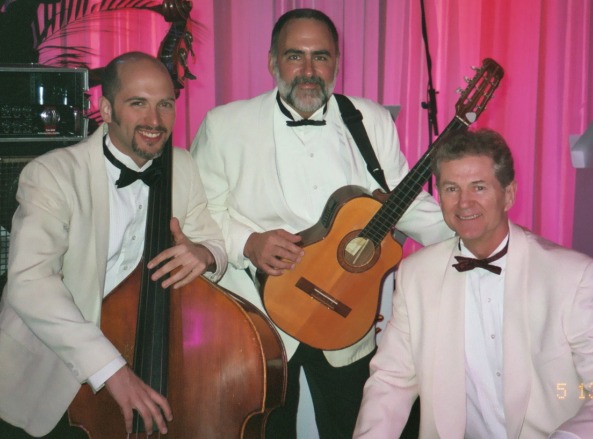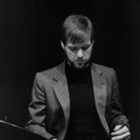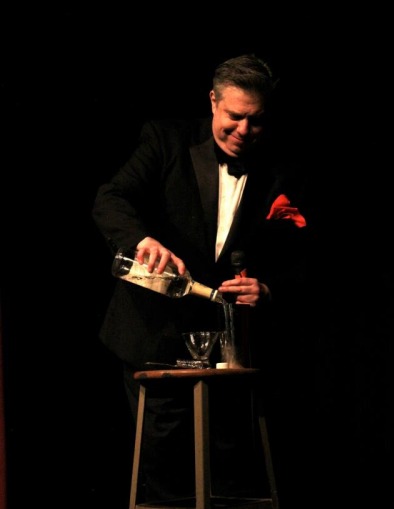Baltimore Jazz Band 2
Internationally respected Jazz saxophonist and composer the leader of this Baltimore Jazz Band has received numerous awards and commissions, appeared on many albums and toured extensively. Currently based in the Washington, DC area, he is a solid contributor to many activities in the nation’s most cherished cultural institutions such as the Smithsonian Institution, the Kennedy Center and Washington Performing Arts Society. He draws many jazz artists to the region to perform and teach at his side.
Baltimore Jazz Band credits
In the US, the leader of this Baltimore Jazz Band has performed and recorded with diverse hit makers such as Ray Charles, Natalie Cole, Bobby McFerrin, Freddie Hubbard, Marcus Miller and Najee. He has collaborated with fellow saxophonist Jeff Coffin, guitarists Steve Herberman and Steve Rochiniski, percussionists Sherrie Maricle and Joe McCarthy, bassists Jimmy Haslip and Gary Grainger, and pianists Helen Sung and Zaccai Curtis.
He has worked with Canadian greats such as PJ Perry, Senator Tommy Banks, big band leader Rob McConnell, the iconic David Foster and trumpet sensation Ingrid Jensen. The leader of this Baltimore Jazz Band concerts and recordings with the Unified Jazz Ensemble, the Jazz Update and other ensembles have been consistently well received by critics.
He was born in Edmonton, Canada in 1965, to a large Ukrainian family. They lived in Benin City, Nigeria for a time and the colorful sights and sounds of that experience have never left him. The leader of this Baltimore Jazz Band began his musical education there, studying classical piano. Back in Canada in his teens, he took up the saxophone relishing any opportunity to play.
Baltimore Jazz Band degree
After attending Grant MacEwan University in Edmonton, Canada he attended the famed University of North Texas, where he earned a master’s degree in jazz performance and West African ethno musicology. He began making his mark as an artist and educator early in his career: touring, teaching and composing before he even graduated.
The leader of this Baltimore Jazz Band then co-founded the Unified Jazz Ensemble, enjoying numerous accomplishments with that group in his 12-year tenure. The quintet toured North America and Asia and were adjunct faculty at Luther College in Decorah, Iowa for two years.
A grant from the Canada Council and studies with Tim Hagans helped him mature as a performer and composer before he became a band leader - the next step in his career. In 2004 he formed this Baltimore Jazz Band, featuring some of the most in-demand jazz artists on the East Coast of the United States.






Learning a new instrument at any age is hard enough, but taking up a former musical hobby can be seemingly impossible to balance with work, family and other responsibilities.
For nearly a decade, Jeff Antoniuk’s Jazz Band Masterclass has provided the means for adult jazz students to move beyond one-on-one instruction and perform in a group setting, both in regular classes and in public performances, such as the upcoming concert at Jazzy’s Lounge in Bowie on April 24.
After he began teaching private saxophone lessons, Antoniuk noticed many of his students were regular adults with day jobs, not just children and teenagers hoping to hone their craft. As his pupils improved and began to ask him where they could play in a group, he found very few options in place.
“I really love working with that population,” Antoniuk said. “It’s so important to people that, in the middle of their busy lives, they are setting aside the time to play music. There are plenty of outreach programs for talented high school to college students, but nothing that fit well for adults.”
Antoniuk assembled a small group of six or seven students in Annapolis; in 10 years, the Jazz Band Masterclass endeavor has expanded to nine groups in Annapolis, five in the Washington, D.C., metropolitan area, a summer camp and a jazz choir, all serving skilled amateurs alongside semi-professionals who are looking for a place to develop their talent.
Playing and improvising in a group setting is key to performing jazz music. Assembling a group of amateur players can become a “rudderless ship” without a director, said Antoniuk, and finding gigs can prove difficult without organization. By supplementing frequent classes led by a professional with two to three concerts annually for each group, Antoniuk can teach his students more than just music technique.
“In ensembles, you get to work on not only music but the human aspect of group dynamics,” he said. “It’s really a conversation. I enjoy facilitating, letting these musicians know how to talk to each other. There’s almost a group therapy going into how we function as a team.”
In addition to working on technique and group skills, the Jazz Band Masterclass groups go into the tradition of jazz as a whole. The century-old genre has strong ties with the oral arts as well as improvisation. Performing for an audience is important both to the development of these students’ skills and jazz itself.
By filling the rehearsal year with approximately a dozen concerts, at which several groups come together to perform at each, Antoniuk gives every student the chance to experience playing live in front of friends and family.
“Beyond just learning a skill and getting better at their instruments, [the students] have to look ahead to the fact that they’ll be playing a handful of songs at a club,” he said. “It puts a little extra energy behind what they’re doing, those good nerves and anxiety really help focus and make those folks get a little bit better a little bit quicker.”
On average, each person stays in the group for four to six years; however, while some students leave after only a few months, others have continued to come back since the inaugural class. Many go on to perform occasional gigs at weddings, restaurants and museums, but some have become professional musicians thanks to their participation in the program.
“I think they find it such an important part of their lives, it’s just something they can’t find elsewhere,” Antoniuk said. “They keep coming back, they see themselves growing, they hear themselves playing better, and they don’t have to do the organizing or choose the music. They can just show up and do their thing.”
Approximately 125 people were in the program last year, and the number remains close to that today. Those students have chosen to take a step in reconnecting with their past, an undertaking that can be difficult after leaving any hobby behind for a period of time. Whether it’s sports, writing or music, taking former passions and fitting them back into a busy schedule sometimes requires the right nudge.
“These are people who loved music as a kid — and so many of us do, and we move on to our busy lives and making money and paying mortgages, and sometimes those important loves and dreams get set aside,” Antoniuk said. “I’m so inspired by anyone that goes back and reconnects with something they loved earlier in life.”
by Kirsty Groff Staff writer, kgroff@gazette.net